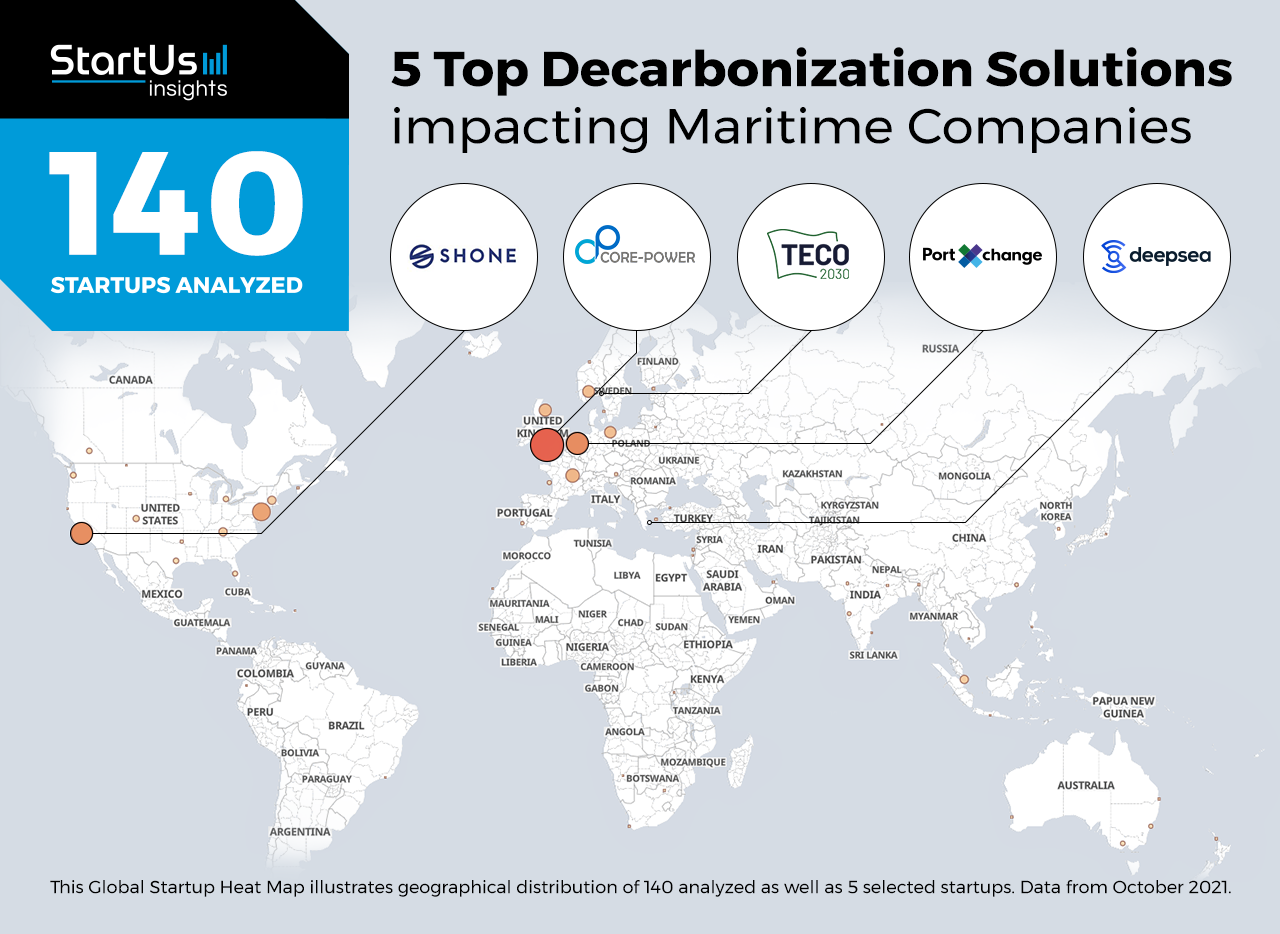Staying ahead of the technology curve means strengthening your competitive advantage. That is why we give you data-driven innovation insights into the maritime industry. This time, you get to discover 5 hand-picked decarbonization solutions impacting maritime companies.
Out of 140, the Global Startup Heat Map highlights 5 Top Decarbonization Solutions impacting Maritime Companies
The insights of this data-driven analysis are derived from the Big Data & Artificial Intelligence-powered StartUs Insights Discovery Platform, covering 2 093 000+ startups & scaleups globally. The platform gives you an exhaustive overview of emerging technologies & relevant startups within a specific field in just a few clicks.
The Global Startup Heat Map below reveals the distribution of the 140 exemplary startups & scaleups we analyzed for this research. Further, it highlights 5 startups that we hand-picked based on criteria such as founding year, location, funding raised, and more. You get to explore the solutions of these 5 startups & scaleups in this report. For insights on the other 135 decarbonization solutions for maritime companies, get in touch.
DeepSea Technologies enables Vessel Emissions Tracking
The shipping industry is under constant pressure to reduce greenhouse gas (GHG) emissions while also improving efficiency. Emission tracking of vessels enables the maritime industry to quantitatively gather emissions data and set measures for pollution reduction. To aid this, startups leverage artificial intelligence (AI)-driven emission tracking and fuel optimization systems to comply with environmental regulations and advance maritime decarbonization.
Greek maritime technology startup DeepSea Technologies provides a vessel emissions tracking solution. Cassandra, the startup’s product, is an AI-powered vessel monitoring and optimization platform that enables users to gain an understanding of the vessel’s daily carbon dioxide (CO2) emissions. The platform also assists in decarbonizing the vessel and fleet by optimizing fuel usage and component performance.
TECO 2030 develops Modular Hydrogen Fuel Cells
Ships powered by diesel and natural gas emit significant air pollutants. At the same time, hydrogen fuel cell (HFC) is an efficient and clean way to store energy in the form of synthetic fuel while producing electrical energy. Since these fuel cells emit only water and oxygen as byproducts, they aid maritime companies to achieve net-zero emissions. Thus, startups now develop modular hydrogen fuel cells for heavy-duty marine applications.
TECO 2030 is a Norwegian startup that provides green maritime technologies to tackle GHG emissions. Their TECO Marine Fuel Cell is a modular, hydrogen-based fuel cell that enables net-zero emissions. The advanced fuel conditioning capability of this product also allows operations on compressed and liquid hydrogen as well as other hydrogen carriers. Additionally, TECO 2030 develops exhaust gas cleaning systems for reducing other pollutants such as sulfur and nitrogen oxides.
PortXchange facilitates Port Call Optimization
Ship and port operations involve a lot of information exchange, often using separate outdated systems which is inefficient and causes delays. Such delays, in turn, lead to increased fuel usage and CO2 emissions. To tackle this, startups provide digital solutions that make the whole process faster while strengthening environmental and financial benefits.
PortXchange is a Dutch startup that develops software solutions for port operators. Their solution gathers all the relevant information into a shared dashboard and offers application programming interfaces (APIs) to integrate it into existing workflows. This enables port authorities and operators to monitor and coordinate the whole process with accuracy and reliability. By maximizing operational efficiency, the startup cuts the idle waiting time of the ships, which lowers fuel usage and carbon emissions. And by reducing call times, the ports have extra capacity to handle more vessels or perform maintenance operations.
Shone develops a Digital Co-Pilot
Shipping accounts for a significant part of global carbon dioxide and sulfur emissions. This is primarily due to large amounts of diesel intake. Therefore, reducing fuel consumption directly impacts the overall carbon footprint of the maritime sector. This is why startups develop energy-efficient solutions like high-efficiency engines and fuel optimization systems that reduce fuel use rates and, hence, lower emissions.
US-based startup Shone offers a digital co-pilot to improve the safety and fuel efficiency of maritime operations. The startup combines ship data from various sources with environmental monitoring and provides them onboard and onshore to understand the overall vessel performance. The AI-based co-pilot, in turn, augments with operation managers to deliver the best course of action to reduce their projects’ environmental impacts. Based on the vessel, environment, and weather information, maritime companies are able to set up emission goals and reduce their fuel consumption rates by optimizing operations. Shone’s solution also delivers 24/7 automated security to the vessel and the crew.
CORE POWER offers Molten Salt Reactors
Cleaner fuel alternatives available for maritime vessels are very limited, for example, bio-based diesel replacements. This is due to high infrastructure costs and viability issues in other alternatives for maritime applications. For instance, powering a ship with electricity either needs an in-ship generation unit or a large number of batteries. To mitigate such issues, startups now provide modular, compact power generation units which are cleaner and tailored for long-period maritime applications. This also saves fuel costs and refueling times while significantly reducing emissions.
British startup CORE POWER provides atomic energy to power ocean transportation. The startup’s marine molten salt reactors (m-MSR) run on molten salt mixed with uranium base as fuel and generate electricity. Unlike conventional nuclear reactors, MSRs offer greater efficiency along with a reliable failsafe system to protect the fuel in case of accidents, mitigating environmental pollution. This way, vessel and fleet owners are able to transition to zero-emission power and propulsion, thereby enabling clean shipping.
Discover more Maritime Startups
Maritime startups such as the examples highlighted in this report focus on emission reduction, clean fuels, and green propulsion. While all of these technologies play a major role in advancing the maritime industry, they only represent the tip of the iceberg. To explore more maritime technologies, simply get in touch to let us look into your areas of interest. For a more general overview, you can download one of our free Industry Innovation Reports to save your time and improve strategic decision-making.




![15 Top Defense Companies and Startups to Watch in Europe [2025]](https://www.startus-insights.com/wp-content/uploads/2025/03/Defense-Companies-in-Europe-SharedImg-StartUs-Insights-noresize-420x236.webp)




